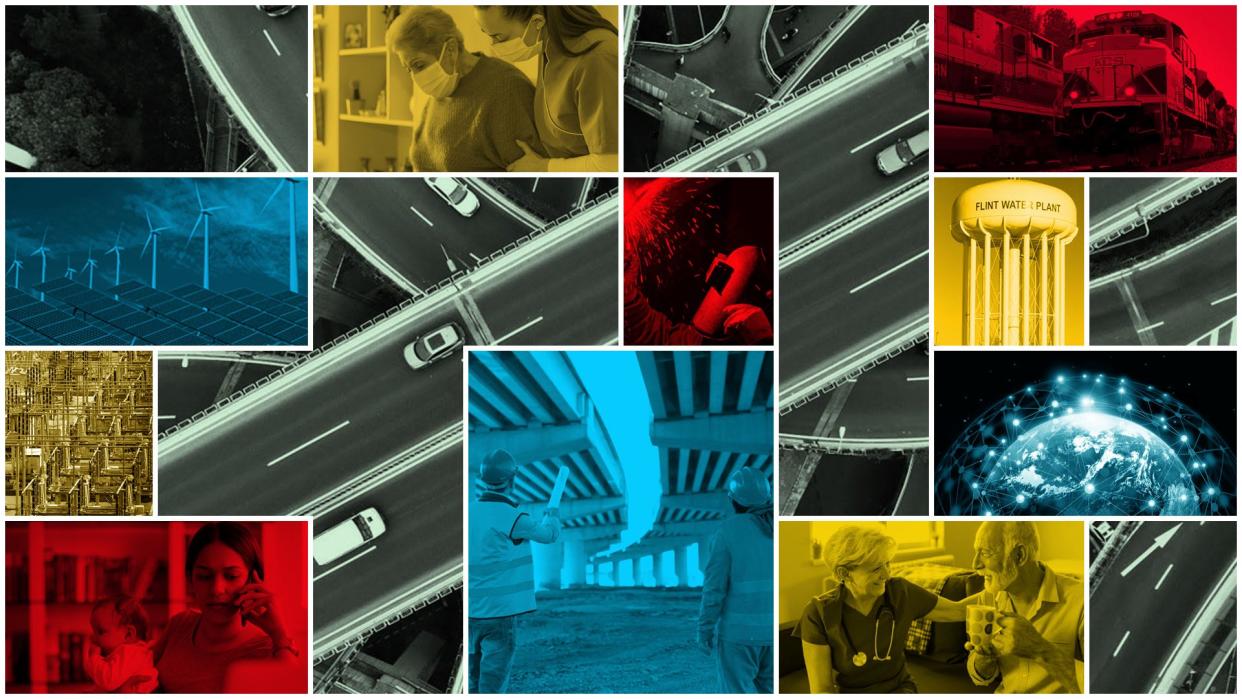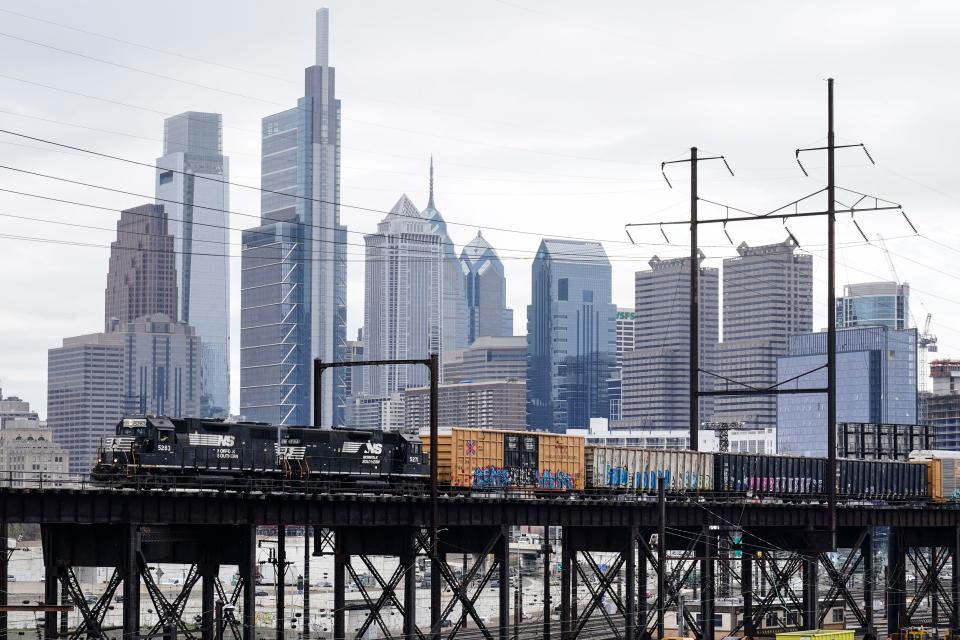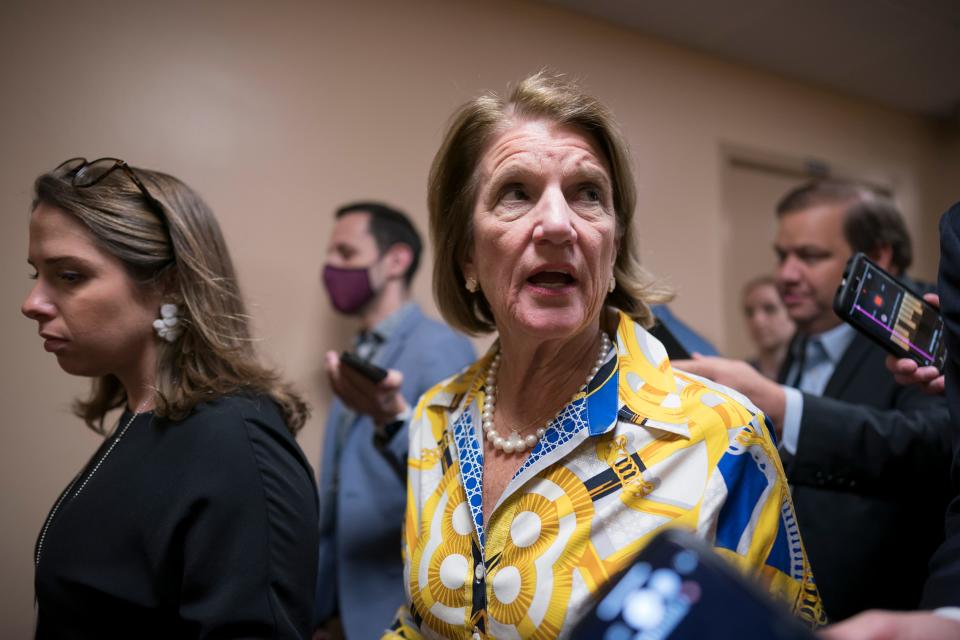'Big question is the scope': Biden, GOP still at odds over 'social infrastructure' as White House signals it wants deal soon

- Oops!Something went wrong.Please try again later.
- Oops!Something went wrong.Please try again later.
WASHINGTON – With a summer target approaching to pass an infrastructure deal with Republicans, President Joe Biden faces a dilemma over the most ambitious parts of a proposal he's said would rival construction of the interstate highway system and the space race.
Does he keep pushing the progressive agenda he campaigned on with a package that addresses "social infrastructure" such as caregiving, housing and climate change, or promote bipartisanship by working with Republicans on a much narrower bill focused on roads, bridges and railways?
Republicans have made it clear they won't support any elements that go beyond physical infrastructure, something that remains a critical point of disagreement months into negotiations and as the White House signals it wants a deal soon
“We want to focus on actual infrastructure – the platforms and services that move people, goods and services through our economy," said Sen. Pat Toomey, R-Pa., on Thursday. “That’s what people understand to be infrastructure, and we can reach an agreement if we focus on those items."
Biden: Biden declares his 'economic plan is working,' pushes infrastructure plan as the next step
Republicans slammed the so-called "human infrastructure" proposal as pet liberal projects even before Biden first unveiled his American Jobs Plan in March and have kept that stance through their latest $928 trillion counteroffer released Thursday. Though that was enough to claim progress ahead of the president's self-imposed Memorial Day benchmark for traction toward a deal, the White House is now circling the week of June 7, when Congress returns, to produce a "clear direction" on a bipartisan package.
"We’re going to have to close this down soon,” Biden said Thursday as the White House expressed encouragement over the new GOP proposal.
Heading into the holiday break, Democratic senators reiterated Biden's call for an infrastructure package that goes beyond bridges and roads.

"We must pass comprehensive jobs and infrastructure legislation this summer," Senate Majority Leader Chuck Schumer, D-N.Y., told reporters Friday. "The American people gave us a Democratic Senate to produce big and bold change on the major issues confronting us and that is what we are doing."
Democrats and activists don't want Biden to cave, saying he should move ahead – without Republicans if necessary – to achieve the ambitious agenda they believe won them Congress and the White House.
GOP offer: GOP senators pitch new $928 billion infrastructure plan in latest offer to Biden
Ellen Sciales with the progressive Sunrise Movement urged Biden not to "cower to Republicans," noting not a single one voted for the COVID-19 relief package in March.
And Sen. Kirsten Gillibrand said the country's post-pandemic phase needs the government to spend money improving day care, education and other elements of the "care economy."
"Without those pieces, you're not gonna be able to recover the economy," she said. "So I think it's a mistake to proceed in a small way, when the moment is demanding a robust response to the economic collapse due to COVID."
More talks are planned for next week after a brief phone call Thursday between Biden and West Virginia Sen. Shelley Moore Capito, the leading Republican on infrastructure negotiations. Both described the call as positive, but she's sticking by her version of infrastructure.
"What is the definition of infrastructure? We have stayed within the boundaries of our original plan. I think that's what the American people think of when they think of infrastructure and that's certainly what we do too," she said Thursday during a news conference in which Republicans unveiled their latest offer.
"The big question is the scope," Capito said.
'The clock is ticking': Democrats grow restless with infrastructure talks as Republicans float next counteroffer
Biden could choose to go it alone with only Democrats using a legislative maneuver called reconciliation to keep his package intact. But there's no guarantee he has the votes to do even that. And yet if he sacrifices his most ambitious elements to score Republican votes, he risks jeopardizing the grand scale he's said is needed to accelerate the U.S economy in the 21st century.
Reconciliation, a process subject to certain rules, would allow Democrats to approve a bill with a simple 51-vote majority without any Republican support. Otherwise, Democrats would need the backing of at least 10 Republicans to overcome a legislative hurdle called a filibuster to bring the plan to a vote.
Schumer said the use of reconciliation was under "serious consideration."
"The events of the last few days probably made every member of our caucus realize that a lot of our Republican colleagues are not willing to work with us on a whole lot of issues, even issues where we're trying to be bipartisan," he said Friday.
Such a path would mirror how Biden won approval of his $1.9 trillion COVID-19 rescue plan in March after talks with Republican fizzled. But Republican Senate Leader Mitch McConnell dared Democrats to try that this time, predicting it will be harder for Democrats to stay unified around an infrastructure plan that has a tax hike.
"They may be able to pull it off, but I think it's going to be really hard, and we're going to fight them the whole way if that's what they have in mind," McConnell said in an interview last week on Fox News.

The guarded optimism surrounding a new GOP proposal this week on infrastructure and the promise of more talks with the White House belies a stark reality: both sides remain far apart.
Senate Republicans upped their offer to $928 billion Thursday, several days after Biden trimmed his American Jobs Act from $2.25 trillion to $1.7 trillion.
There's good news: the gap between the two sides is about half what it was just two weeks ago. And the new GOP plan includes money for electric charging vehicles, a priority for the Biden administration trying to address climate change by lowering fuel emissions.
Infrastructure visualized: Joe Biden wants to spend $2 trillion on infrastructure and jobs. These 4 charts show where the money would go.
But even if Biden embraces a proposal for only traditional infrastructure – matching what Republicans want – both sides so far remain intractable on how to pay for it.
Republicans refuse to consider the corporate tax hike Biden wants to use to pay for his plan, noting it would undo tax cuts they approved in 2017, and Democrats refuse to allow billions in recently passed COVID-19 relief to be "repurposed" for infrastructure as Republicans do in their plan.
And beyond their competing definitions of infrastructure, the two sides haven't agreed on what physical infrastructure should be covered.
White House press secretary Jen Psaki said the Biden administration remains "concerned" that the GOP counteroffer has little or no funding for fixing Veterans Affairs hospitals, rail, repairing transit system, replacing the nation's lead pipes and investing in clean energy jobs.
Big differences on how to pay for it
It's not just what's in the bill that has senators at odds, it's finding the money to finance it. where the money to pay for it will come from.
The $928 billion package GOP senators unveiled Thursday would pay for some transportation improvements by siphoning billions in COVID relief money as part of Biden's American Rescue Act that Congress passed in March.
Infrastructure talks: Infrastructure talks hit snag as Republicans reject Biden's reduced $1.7 trillion counteroffer

Republicans would prefer to "repurpose," or redirect, money Congress approved in March as part of the $1.9 trillion American Rescue Plan. Capito mentioned that some of the money could come from unspent federal unemployment benefits since 23 states have declined to apply the $300 weekly benefit to help those out of work.
That's a no-go, according to Psaki.
"We are worried that major cuts in COVID relief funds could imperil pending aid to small businesses, restaurants and rural hospitals using this money to get back on their feet after the crush of the pandemic," she said in her statement.
Republicans, meanwhile, are refusing to budge on the president's proposal to raise taxes on corporations from 21% to 28%, a linchpin of his economic justice plan to make the wealthiest Americans pay more to help the country.
Toomey said raising taxes is a nonstarter.
"We believe that the 2017 tax reform contributed significantly to enabling us to achieve the best economy in my lifetime. And that's no small thing," he said in Thursday's news conference. "We're not interested in undoing the provisions in the tax reform bill that allowed us to get here."
This article originally appeared on USA TODAY: Biden infrastructure plan: Sides at odds on social infrastructure

